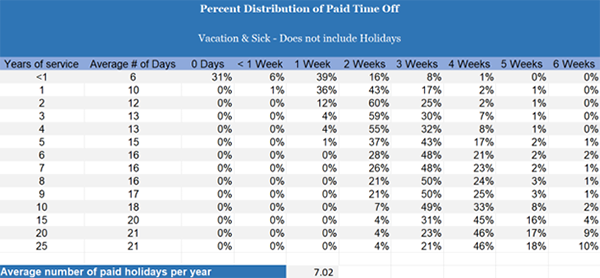In today’s competitive job market, attracting and retaining top talent is crucial. Employee engagement and retention play pivotal roles in this effort, with paid time off (PTO) being a key yet often overlooked element. In this article, we’ll examine how PTO policies have the potential to profoundly impact both employee engagement and retention.
Table 1: Precent distribution of paid time off

PTO statistics from the 125 Study Group firms who participated in our 2023 Employee Compensation Report.
Study Group members tend to offer less PTO than the average US company. The below bullet points list the average US industry PTO per the US Bureau of Labor Statistics for civilian and private industry consolidated leave plans in 2023:
- 14 days after 1 year of employment (4 days more than SG average)
- 18 days after 5 years of service (3 days more than SG average)
- 20 days after 10 years of service (2 days more than SG average)
- 23 days after 20 years of service (2 days more than SG average)
Study Group members may consider if the amount of PTO being offered is appropriate.
Correlation Between PTO and Employee Engagement
Employee engagement is more than a trendy term; it is often helpful for a thriving and productive workplace. PTO can be vital in enhancing employee engagement by providing the necessary time and flexibility for individuals to recharge and maintain a healthy work-life balance. Studies have shown that engaged employees are more loyal to their jobs and contribute more effectively to their organizations.
The evidence in these studies indicates companies with thoughtfully designed PTO policies report higher levels of job satisfaction among their employees. This satisfaction translates into better morale, increased productivity, and enhanced job performance. When employees feel that their employers genuinely care about their well-being, they are more likely to stay engaged and committed to their work.
Mental and Physical Health
PTO can also significantly impact employees’ mental health. High levels of workplace stress can lead to burnout and decreased productivity. PTO offers employees the essential opportunity to relax and recharge, thereby reducing stress and enhancing mental well-being.
Moreover, long working hours have the possibility to lead to serious health consequences. According to the World Health Organization, working 55 hours or more per week increases the risk of stroke by 35% and the risk of heart disease-related death by 17% compared to a standard 35 to 40-hour workweek. This data underscores the need for organizations to prioritize employee well-being, including the provision of sufficient PTO.
PTO-Based Retention Strategies
Going the extra mile can significantly enhance employee retention.
- Tailored PTO Packages: Understand that a one-size-fits-all approach sometimes doesn’t work for everyone. Offer flexible PTO packages that allow employees to customize their time off according to their unique needs, including options for personal days, family leave, or sabbaticals.
- Encourage PTO Usage: Actively promote and encourage employees to use their PTO. Implement policies that discourage the accumulation of unused leave, ensuring employees take the necessary time for rest and rejuvenation.
- Paid Sabbaticals: Consider offering paid sabbaticals for long-term employees. This could possibly provide extended time off for personal growth or travel, fostering a deeper sense of appreciation.
- Wellness Initiatives: Enhance your PTO benefits by incorporating wellness initiatives. This could include partnerships with fitness centers, access to mental health resources, or stipends for wellness-related activities during time off.
- Recognition and Celebration: Acknowledge employees’ milestone achievements or exceptional work with special PTO perks. For example, celebrate work anniversaries with extra days off as a token of appreciation for their dedication.
Retaining experienced employees is both cost-effective and beneficial for an organization’s stability. Generous PTO policies are likely to cultivate long-term employee commitment by showing that the company values its workforce and recognizes the importance of work-life balance.
Consider the cost savings associated with retaining experienced employees who are already familiar with the company’s processes and culture. Investing in their wellbeing through comprehensive PTO benefits has the likelihood to not only be a retention strategy but also be a prudent business decision.

